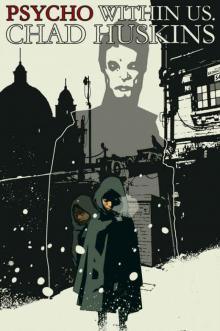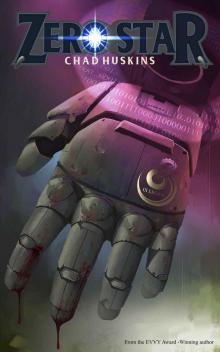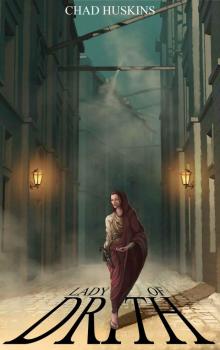- Home
- Chad Huskins
Lady of Drith
Lady of Drith Read online
Lady of Drith
Chad Huskins
Published by: Nine Dusks Entertainment
Edited by: William Fruman
Cover art by: Jack Baker
Copyright 2016 Chad Huskins
PUBLISHER’S NOTE: This is a work of fiction. Any similarities between persons living or dead, events, business establishments, or locales is strictly coincidence.
The scanning, uploading, and uploading of this product via the Internet or any other means without the permission of the author is a crime and is punishable by law. Your support of the author’s rights is appreciated.
Other books by Chad Huskins:
Khan in Rasputin’s Shadow (winner of the 2009 Evvy Award for fiction)
Rook’s Song Series:
Book I: The Phantom in the Deep
Book II: The Immortal Game
The Psycho Series:
Booki I: Psycho Save Us
Book II: Psycho Within Us
Book III: Psycho Redeem Us
The Devil in the Dust Bowl
The Sol Ascendancy
Praise for Chad Huskins’s novels:
On Psycho Save Us:
“Huskins knows how to create characters that live and breathe (and sometimes cackle maniacally), and knows how to shape drama to keep a reader on the edge of their seat. Five stars!”
- Heath Pfaff, bestselling author of The Hungering Saga
“[Psycho Save Us] sustains a high level of intensity…its audacious over-the-top approach is imaginative and not likely to be forgotten. A disconcerting central character is adeptly balanced by a strong young girl likely to win readers’ hearts.”
- Kirkus Reviews
On Khan in Rasputin’s Shadow:
“This is a top pick for any suspense fan looking for espionage and intrigue. Five stars!”
- Midwest Book Review
: The Hour of the Wyrm:
Imperator Fedarus, presider of the Senate and ruler of all of Drith, stepped outside his house that day not knowing it would be his last sunrise. He was surrounded by a dozen of his Rain Guards, all dressed in their full regalia and their cerulean-blue cloaks. How could he know that they would fail in their duty to protect him? Like any mortal, he couldn’t see his death coming.
It was the Hour of the Wyrm, still early. There was a soft wind that felt unseasonably cold. Such a wind, the augurs would tell you, were a sign of Uda, the Death God. Whenever such a wind was felt, one could be sure that Uda walked the streets in search of fresh souls. So said the augurs, whose job it was to read signs and foresee the future.
Fedarus was a foreign-born man, who had become a conqueror before he became a citizen of Drith. He’d led legions of thousands, ruined entire cities, and brought riches from those conquered cities to Drith, which he handed out to the homeless and downtrodden like candy. His popularity with the lower-class, therefore, had made him as invincible in the Senate as he had been on the battlefield.
There was no one, it seemed, that Fedarus could not make follow him. No one, that is, except the Senate.
He did not see his assassins forming around him as he made his way through the cobblestoned streets that wound between the limestone buildings. He did not see them as he made his way through the Forum towards the Senate.
The assassins were not dressed in dark robes or masks. No, they came as friends, dressed in their senatorial togas. The only disguise they wore was their friendship, the only masks they wore were their smiles.
As he made his way down the Avenue of Coin, Fedarus gave a signal to his slaves, who recognized the gesture and immediately began handing out small purses of coins to the beggars all along the street.
“Thank you, Imperator!” one of the beggars shouted.
“The gods be thanked that you are here for us, Fedarus!” called another.
Fedarus smiled pleasantly, for he was used to this kind of treatment. The senators gathered around him, their scowls showing what they thought of his charity.
“It’s perverse,” one of them grumbled.
“See how he spoils them!” muttered another. “How will they know to respect their betters if they’re always getting handouts?”
The Imperator and his retinue of guards and slaves wound their way through ancient streets. Drith had been built piecemeal ages ago, and was therefore littered with blind alleys, crooked streets, and buildings of crumbling mortar. Ivy climbed high on every wall, pillar, and steam pipe, doing its best to mask the city’s decay.
They crossed the Street of Liberty, then moved onto the Avenue of Gods, where they passed beneath the steely gazes of Mezu, the All-God, and Loraci, goddess of justice. The statues had been chiseled out of marble, and had stood for four hundred years.
Fedarus paused in front of the god and goddess to make the sign of the Divine Six in the air, then moved on.
Despite the chill wind, the streets were warmed by the steam roiling thick off the copper pipes that ran overhead and underfoot. Steam had come to Drith two decades ago, and the Steamwright Collegium had been the main builders of those engines that brought such glory and power. However, a side effect was the clouds of steam that commonly traveled down each road and alley, sometimes obscuring one’s vision.
The steam might be partially to blame for Fedarus’s inability to see the assassins’ blades, some of which were hidden not so carefully.
The bronze and copper steam pipes formed a crisscrossing matrix overhead, running over houses and mariya shops, sometimes even through windows. Some people thought the piping was a blight on Drith, that it had muddied its natural and architectural beauty, but Fedarus rather thought it made her look like the most sophisticated city in the world.
And I should know, he thought. For I have seen all the great cities, and stamped them beneath my feet.
That part he was no longer proud of. In his youth, warring and killing and conquering had been all that mattered. Now, though…
Fedarus’s slaves continued handing out coins until they had none left to give. Fedarus kissed the heads of the babies whose mothers offered them up. “Bless you, Imperator!” they said to him.
He let them touch his robe for a blessing, but not for too long—Rain Guards made sure the crowds kept just far enough back. And possibly the Rain Guards didn’t want the crowd to be so close that they could help their beloved Imperator when he needed them.
Perhaps they were in on it the whole time, as well.
The crowds backed off as the Imperator arrived at the steps of the Senate. He started up, and, as he did, he noted that the shadows of the statues around him had grown long, and that the shadow of Loraci’s judgmental finger was pointed at his shadow. Later, the augurs would say this was an evil omen.
As he reached the top of the steps, the Iron Door moaned open. The giant cogs clicked, scraped, and ticked as they went to work opening the massive door, and the steam-powered pistons squealed and hissed with the effort.
Fedarus paused here, turning to wave at the throng of his followers, all of whom cheered. Except for the senators, of course. They would never cheer for him. Not until he proved he was a true Drithean, and renounced completely his connection to his homeland of Istysia.
All in good time, he thought, believing he had all the time in the world. All in good time. When I marry Drea Kalder, they will see I have nothing but the greatest devotion to Drith.
Drea Kalder was his in-waiting bride. She was hiding, as was custom for a Drithean bride, so as no evil vehl could find her and poison her before her wedding night. Soon, he would get to see her, and marry her. Fedarus hardly knew the girl, but he’d known her father, and that man had been very sensible.
Fedarus had loved Drea’s father. And, though he barely knew the girl, Fedarus believed he would gr
ow to love her, too. He believed that in his heart. And why should he not have love? He deserved it. After a lifetime of shedding blood for the sake of conquering, after battling his way through the Senate and achieving the status of Imperator, he deserved some happiness.
And I shall have love, he thought. For the first time, I shall know love and contentment.
It seemed impossible, but with age comes enlightenment, and Fedarus was ready to settle down. He wanted Drith to be at peace. He wanted to liberate the slaves. He wanted to instigate the Five-Year Law that Drea Kalder’s father had advocated.
And with Drea Kalder as his wife, he felt the message would be clear. He was going to honor the Kalderus. He would honor the wishes of his dead friend, and with his friend’s daughter at his side.
She doesn’t know me well just yet, but I predict great things for us, he thought, not even aware of the blade hiding just beneath the robe of the closest senator.
Or, perhaps the Imperator did sense it. For he saw the glint of something on Senator Nippus Titung’s robe, the glint of a blade where one ought not to have been…
But if he saw it, he discounted it immediately. For though he’d once been a warrior, time spent in the Senate and with attendant slaves had blunted Fedarus’s instincts. He must have wondered what fool would have the courage to assassinate an Imperator alone? Certainly, Imperators had been assassinated before, but never by a lone senator, and never anywhere near the Senate.
And besides, the augurs had predicted that this would be an auspicious day for convening the Senate. They told him as much. Why, just this morning, a senior member of the Council of Augurs had himself opened up a sheep’s intestines and read the signs within, and the message was clear: Today was a day of great change for Drith.
“Hyra herself will be with us,” the augur had said, speaking of the goddess of seasons and change. But the augur hadn’t quite pinned down the reason behind the great change.
As Fedarus approached the Senate atrium, someone called out to one of the Rain Guards. It was a senator, Dariun Falgrate, who wanted a word with the Captain of the Guard. The two of them spoke of some small matter, and the Captain waved over more of his men.
Before he realized it, Fedarus was utterly alone. He thought nothing of it, for the Senate above all places was the safest place in Drith.
As soon as he entered the atrium, someone called to him.
“Imperator!” the man said. It was Phaedos Syphen, patriarch of the Syphenus, and a senator of a wealthy district in Upper City. “Imperator, may we have a quick word?”
“Not now, Senator Syphen,” Fedarus said. “Can’t you see we’re about to begin session? You should be in there yourself.”
“It won’t take a moment, Imperator. It concerns your farming land outside the city. It seems there’s been a disturbance with some pig farmers on your property.”
Fedarus sighed. This again. Everyone knew that the pig farmers whose property abutted his vacation home outside of Drith were commonly trespassing and letting their pigs eat the stock of his gardens. He’d been trying to keep the foul savages away for months.
Fedarus stepped into the atrium to have a word with Senator Syphen. There, beneath the gazes of the statues of Hyra and Domas, Fedarus felt the first hairs prickle on his back. Old instincts began to kick in, for Syphen was not alone. No less than twelve other senators were there, all of them with faces familiar.
“Well?” he said. “What’s all this, then?”
The senators knew that Fedarus had once been a warrior—a conqueror—so they had made sure not to do this alone. They had come prepared.
They all just stared at him, half of them afraid, the other half unsure. Only Phaedos Syphen appeared calm. “Do it,” he said.
“Do what?” Fedarus said, taking a step back towards the exit. “What’s going—”
As soon as he saw the first blade, the Imperator knew what this was. He knew. His blunted instincts had returned with an edge, but a moment too late.
And he also knew there was no escape. His assassins—his senators—had made sure of that.
When the first blade was plunged into him, Fedarus’s only thought was of the peace he’d been so close to bringing to Drith, and the love he’d hoped to share with Drea Kalder.
He fought back. He punched and kicked, he disarmed one of the senators and bit out a chunk of his neck. He knocked one unconscious with his elbow. But it was no matter. The blades kept stabbing him, and soon, he stood in a pool of his own blood.
Panting, he smiled—he actually smiled—and thought, Of course, how could I be so foolish? It had to end this way. It had to. For just as the Fourteenth Precept says: We can have love, we can have power…
But we cannot have both.
: The In-Waiting Bride :
The Man in the Charred Temple had haunted her dreams for weeks, and he always frightened her. He stood there as usual, perched confidently atop a balcony on the highest window, burnt-green curtains fluttering behind him in a sourceless breeze. He wore a brown robe perfectly fitted for him, though a little shabby, along with his usual calm and haunting gaze.
Even from this distance, Drea could see that gaze. There was invitation in it, one she felt compelled to resist, yet also left her curious.
She didn’t know who he was or what he wanted, the dreams never told her that much, but they did somehow convey that he had been waiting for her. He had always been waiting for her. He would always wait. The dreams conveyed this much.
The world tilted. The sky widened. The illogic of dreams imposed itself.
She stood in a field of green grass and brown reeds that swayed in that same soft, sourceless wind. The grass whispered in conspiracy all around her, as if secrets were being passed behind her back. Above her was a sun both yellow and bold, peeking through clouds that were spread thin as cotton. The clouds were moving fast, as if they had someplace to be.
These were all familiar elements to the dream.
Also familiar, the smell of springtime in the air, the hint of jasmine and freshly budding plants. There was the buzz of the insects that darted in front of her face, chasing after mates or after prey.
The temple on which the Man stood was not one that Drea knew. It was not the Temple of Hyra or the Temple of Yanuus, nor was it the Temples of Mezu, Loraci, or Sora.
The temple was made of burnt bricks, each one stacked high and proper, and with perfect symmetry all around. To her, it appeared as though the temple had been well made, like some architect had really poured their heart into it…but then something terrible had happened to it, hadn’t it? Yes. The Man had come. He had burned the temple.
Again, the dream told her none of this, but her instincts filled her in.
Drea stood there for what might have been an eternity—in dreams, time was as elastic as kudrai silk—but after eternity finally ended, the Man in the Charred Temple raised his hand. He gently waved, beckoning to her.
For a moment, Drea considered going to him. There was an easy path in front of her, a gravel road lined with dried and brittle bushes, leading a hundred feet straight up to the front doors of the temple, which were made of wood and had been burned a harsh black. She started forward, but something stopped her.
It was a voice, calling to her from someplace far away, yet nearby. Distance, like time, was also elastic in dreams.
The voice echoed, as if coming from a long corridor. “You know better than to trust him,” it said.
That part was different. The dream had never included some mysterious voice from the ether. Come to that, the dream was altered in more ways than just the voice. For instance, the Man in the Charred Temple had never beckoned to her before, of that she was certain. And his smile had never once wavered, yet now it had, she could clearly see that he was upset with her. A dark cloud had fallen over his features, she was sure of it.
He was angry.
The voice that had spoken to Drea sounded familiar, though in the dream she could not place it. But
it was right, she did know better than to trust the Man in the Charred Temple.
Then why was I just about to go to him? Drea thought. Of course, she knew the answer. Because this is a dream, and I’m curious. Knowing it was a dream made her bold.
That boldness had gotten her into trouble many times, with only Thryis to bail her out…
“Don’t go to him,” the voice said again. “Don’t you go, flower. You know better.”
Flower? Drea thought. Who’s calling me flower?
Then, all at once, and with mounting fear, Drea realized why the voice sounded so familiar, and why she had been unable to place it right away. It was a voice she had not heard in almost a year, because the person speaking it was dead.
“Mother?” she whispered, her voice trembling.
“I’m right here, flower.”
Drea turned, and felt a needle of ice run through her heart. Her mother stood not five steps away, dressed exactly the way Drea remembered her on the day she died. She wore the yellow stola and brown sandals that they had picked out together in the Forum, as well as a black palla drawn over her head.
This…this was not part of the dream. This had never been part of the dream. And even though she knew it wasn’t real, Drea still went to her. It was instinctive, she needed to touch her mother, especially now that she was so afraid. But no matter how fast Drea ran, her mother always remained just out of reach. And she grew fainter.
The illogic of dreams.
“Mother? Mother, come back!”
“Don’t you go to him, flower,” her mother said, looking at her apologetically, her face saying she didn’t want to leave, but must. “Trust your own instincts, they’ve always been good. Don’t you go to him—”

 The Phantom in the Deep (Rook's Song)
The Phantom in the Deep (Rook's Song) Psycho Within Us (The Psycho Series Book 2)
Psycho Within Us (The Psycho Series Book 2) Zero Star
Zero Star The Immortal Game (Rook's Song)
The Immortal Game (Rook's Song) Lady of Drith
Lady of Drith